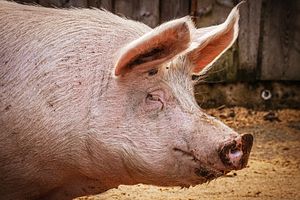Trans-Pacific View author Mercy Kuo regularly engages subject-matter experts, policy practitioners and strategic thinkers across the globe for their diverse insights into the U.S. Asia policy. This conversation with Dr. Mike von Massow – associate professor, department of food, agriculture and resource economics, University of Guelph, Canada – is the 203rd in “The Trans-Pacific View Insight Series.”
Explain the impact of African swine fever in China, the world’s largest consumer of pork, on Canada’s pork industry.
African swine fever is a ravaging the Chinese swine industry. It has high rates of mortality and is very contagious. The virus can live for a long time in meat so even shipping pork or pork products between regions can lead to the spread of the disease. In an effort to contain the spread of the disease, China is liquidating a large portion of the swine herd. This is happening at a time when Chinese pork consumption is increasing. China is a large importer of pork and the disease is leading to a larger demand for imports. This presents a significant opportunity for growth of exports from Canada to China in the absence of new trade actions to block those shipments.
How has the Huawei extradition case complicated Canada’s pork export efforts to China?
The arrest of Huawei CFO Meng Wanzhou, at the request of the United States government, has created a significant irritant in the relationship between Canada and China. This has been exacerbated by statements by U.S. President Donald Trump, recently refuted by Secretary of State Pompeo, that he might consider connecting the case of Meng Wanzhou with a trade agreement with China. China has raised technical issues in both canola and pork markets that have curtailed exports from Canada to China. There is a broad consensus that the trade action is tied to the Huawei case. There is also some suggestion that China wants to send a signal that they are not desperate for pork. While Canada is working to address the technical issues, it is not clear that other issues will not arise until the Huawei case is resolved. China is exerting economic pressure in an effort to resolve the legal issue.
How might Ottawa effectively manage U.S.-China trade tensions and the Huawei case with Canada’s meat exports to China?
Canada is a small player in this ongoing fight between the U.S. and China. The case of Meng Wanzhou is before the courts. Also hanging over the relationship is the decision by the Canadian government on the future role of Huawei in the development of 5G networks. The Chinese trade action is strategic in both target and timing. Canada has a federal election coming this fall and the opposition is pushing the government to resolve the trade dispute with China without explicitly connecting it to the Huawei case.
Canada has little leverage to influence the relationship between the U.S. and China. The trade action is unlikely to be resolved until the case of Meng Wanzhou is resolved – and then only if she is released rather than being extradited to the United States.
Canada can work to raise the technical issues with respect to the agricultural products – export certificates validating the absence of a particular feed additive (ractopamine) in the case of pork. There is a chance that resolving the issue may allow for exports of pork to China to resume. China needs and wants the pork, and Canada is considered a quality and trusted supplier. It is more likely, however, that until the Huawei case is resolved trade in pork will be curtailed.
Identify other Canadian agriculture and food industries that China might target in retaliation vis-à-vis the United States.
Canada exports a significant volume of agricultural products to China. Canola is a significant export but it is already blocked under a separate technical issue – also thought to be related to the Huawei case.
China is also an important market for pulses [legumes], beef, seafood, wheat and barley. China represents a smaller share of total exports in those products, so the leverage is reduced. The growing demand for premium products, specifically beef and seafood, and the tension with the U.S. should mean that China represents a growth opportunity for Canadian agri-food products. There would be pain from the loss of access that is exacerbated by the loss of the growth potential.
Assess Ottawa’s leadership and leverage in mitigating geopolitical risks of fallout from the U.S.-China trade and technology war on Canada.
Canada is a small player relative to these geopolitical battles, and China understands it has leverage. China represents a significant export market for Canada, while Canada represents a small proportion of Chinese exports. Canada also has important relationships with both the U.S. and China. The Canadian government will endeavor to convince both the Chinese and the Americans to resolve their issues but has little leverage in either case. The opposition Conservatives, who are currently even in the polls with the governing Liberals, have said they would exclude Huawei from the development of 5G networks in Canada so the relationship could get worse before it gets better.
Unless the Government of Canada is willing to circumvent the legal process and international agreements, the issue of Meng Wanzhou will be resolved in the courts either favorably or unfavorably. The only other leverage would be to allow for Huawei technology to be used in the establishment of 5G networks in Canada which raises concerns over security.
Canada has historically had a strong relationship with the United States. This has become strained in both trade and other issues under the current U.S. administration. This means it is unlikely that the U.S. will make concessions in support of Canada in the trade dispute with China. In fact, despite high tariffs and suggestions China won’t buy U.S. agricultural products, there is some U.S. pork moving to China so there may actually be a disincentive to help open the market for Canadian pork.

































